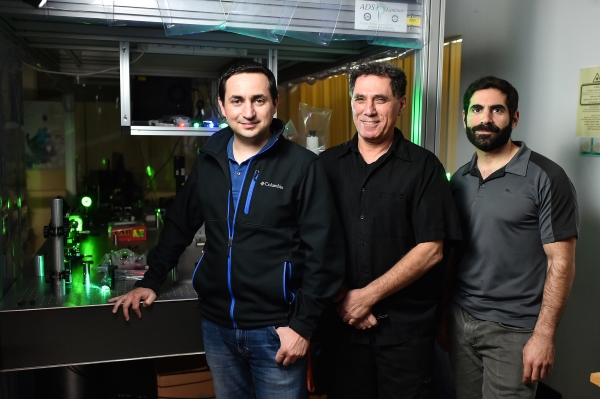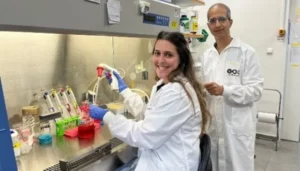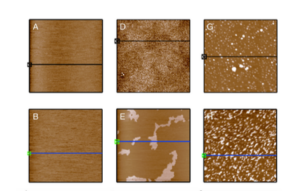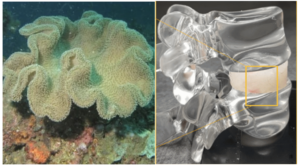Technion (Israël) et Université de Floride (USA) : un nouveau système de matériau semi-conducteur

[:fr]
Les chercheurs du Technion (Israël) et de l’Université de Floride (USA) ont démontré que, non seulement les isolants topologiques sont théoriquement possibles et expérimentalement réalisables, mais qu’ils permettent aussi de créer des lasers extrêmement performants.
Le domaine des isolants topologiques est l’un des domaines les plus innovants et prometteurs de la physique moderne. Ces matériaux ont pour particularité d’être des isolants dans leur intérieur tout en permettant de faire passer un « super courant » sur leur surface. Celui-ci n’est pas affecté par les défauts et les aspérités du matériau et il est alors continu uni-directionnellement et sans être dispersé.
En 2013, le groupe du Prof. Moti Segev, professeur au Technion en Israël, introduit pour la première fois le concept d’isolant topologique, où la lumière se déplace sur les bords d’un réseau bidimensionnel servant de guide, sans être affectée par les défauts et les aspérités de ce matériau. Dans une nouvelle étude publiée en février dans la revue Science, les chercheurs ont trouvé un moyen d’utiliser les propriétés des isolants topologiques photoniques pour construire un nouveau type de laser possédant un comportement fondamentalement unique et qui améliore grandement la robustesse et la performance des réseaux-lasers, ouvrant ainsi la porte à un grand nombre d’applications futures.
Cette étude a été menée par le Prof. Segev et son équipe en collaboration avec les professeurs Christodoulides et Khajavikhan de l’Université de Floride.

Pour ce faire, les scientifiques ont construit un système où la lumière se propage dans une seule direction sans subir d’interférences (qui peuvent provenir des défauts du matériau ou de la forme générale des bords de l’objet). L’expérience montre que ceci conduit à l’obtention d’un laser monomode très efficace, c’est-à-dire un laser ayant une fréquence bien définie (ayant donc un mode longitudinal fixé). Un seul mode longitudinal sera alors autorisé à osciller, ce qui permettra d’obtenir une radiation lumineuse très pure.
Le réseau fabriqué utilise des matériaux semi-conducteurs standards et ne nécessite pas de champs magnétiques ou de matériaux magnéto-optiques exotiques, ses propriétés topologiques provenant de sa structure. Par conséquent, il peut être intégré dans des dispositifs classiques utilisant des semi-conducteurs.
Cette étude ouvre la voie à l’étude d’une nouvelle classe de dispositifs photoniques topologiques qui pourraient être intégrés à divers dispositifs photoniques.
Auteur : Guillaume Duret, post-doctorant au Technion pour le BVST
Publication dans Science 1er février 2018
[:en]
Israeli and US researchers have developed a new highly efficient coherent and robust semiconductor laser system: the topological insulator laser. The findings are presented in two new joint research papers, one describing theory and the other experiments, published online by the prestigious journal Science on Thursday, February 1.
Topological insulators are one of the most innovative and promising areas of physics in recent years, providing new insight into the basic understanding of protected transport. These are special materials that are insulators in their interior but conduct a “super-current” on their surface: the current on their surface is not affected by defects, sharp corners or disorder; it continues unidirectionally without being scattered.
The studies were conducted by Moti Segev, who holds the Robert J. Shillman Distinguished Research Chair at the Technion – Israel Institute of Technology and his team: Dr. Miguel A. Bandres and Gal Harari; in collaboration with Professors Demetrios N. Christodoulides and Mercedeh Khajavikhan and their students Steffen Wittek, Midya Parto and Jinhan Ren at CREOL, College of Optics and Photonics, University of Central Florida, together with scientists from the US and Singapore.

Several years ago, the same group from the Technion introduced these ideas in photonics, and demonstrated a Photonic Topological Insulator, where light travels around the edges of a two-dimensional array of waveguides without being affected by defects or disorder.
Now, the researchers found a way to use the properties of photonic topological insulators to build a new type of laser which shows a unique fundamental behavior and greatly improves the robustness and the performance of lasers arrays, opening the door for a vast number of future applications.
“This new laser system went against all common knowledge about topological insulators” said Prof. Segev of the Technion. “In a nut shell, the unique robustness properties of topological insulators were believed to fail when the system contains gain, as all lasers must have. But we have shown that this special robustness survives in laser systems that have a special (“topological”) design, and is able to make the lasers much more efficient, more coherent, and at the same time immune to all kinds of fabrication imperfections, defects and alike. This seems to be an exciting avenue to make arrays of miniature lasers work together as one: a single highly coherent high power laser.”

In their research, the scientists built a special array of micro ring resonators whose lasing mode exhibits topologically-protected transport – light propagates in one direction along the edges of the laser array, immune to defects and disorder and unaffected by the shape of the edges. This in turn, as they experimentally demonstrated, leads to highly efficient single-mode lasing that lasts high above the laser threshold. “It is a great pleasure to see fundamental research pans out to have such profound yet tangible applications” said Prof. Christodouldies from UCF.
The fabricated array used standard semiconductor materials, without the need for magnetic fields or exotic magneto-optic materials; hence it can be integrated in semiconductor devices. “In recent years, we have found new tricks to manipulate light in an unprecedented way. Here by using clever designs, we fooled photons to feel as if they are experiencing a magnetic field and they have spin,” said Prof. Khajavikhan, one of the lead scientists in the team.
The researchers demonstrated that not only are topological insulator lasers theoretically possible and experimentally feasible but that integrating these properties create more highly efficient lasers. As such, the results of the study pave the way towards a novel class of active topological photonic devices that may be integrated with sensors, antennas and other photonic devices.
[:]







